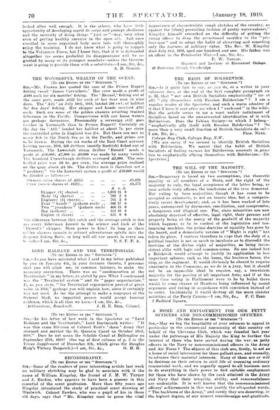THE WILL OF THE MAJORITY.
[To THE EDITOR OF THE " SPECTATOR.")
SIR,—Democracy is based on two assumptions. the theoretic equality of all members of a State, and the right of the majority to rule, the loyal acceptance of the latter being, as your article truly affirms, the touchstone of the true democrat. But ruling by bare majorities, though it has come to be accepted as axiomatic, is not an innate idea, but a compara- tively recent development; and, as it has been worked of late years, untempered by discussion, conciliation, and compromise, a dangerous and illogical one For, since minorities are now absolutely deprived of effective, legal right, their persons and property being at the mercy of the goodwill of the majority which happens to be in control of the legislative and tax- imposing machine, the prime doctrine of equality has.gona by the board, and a democratic version of "Might is right" has taken its place. I venture therefore to urge that the duty of is political teacher is not so much to inculcate as to discredit the doctrine of the divine right of majorities, aa being incon- sistent alike with logic and common-sense. No ono indeed but a Bolshevik would attempt to justify its application in less important spheres, such as the home, the business house, the ship, or the regiment. It would obviously be absurd to require unanimity in the Commons, as we do in a jury, but it should not be an impossible ideal to require, say, a two-thirds majority for the passing of all important Acts; and if at We same time voting in Parliament were to be by ballot there would lie some chance of Members being influenced by sound argument and voting in accordance with conviction instead of to order. Incidentally it would destroy all the more sinister


































 Previous page
Previous page